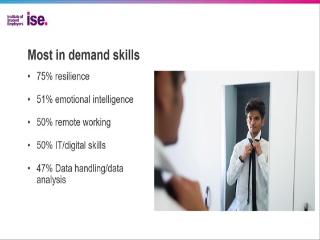Skills and behaviours (for the modern workplace)
Graduate employers actively recruit students and graduates from university as they have been proven to acquire skills, attributes and knowledge relevant for higher skills-level and professional work across various sectors.
These skills and behaviours are acquired through your degree programme, co-curricular activity, extra-curricular activity and wider student experience and personal networks that you create during your time at university.
Over the years, the kinds of skills and behaviours sought by graduate employers have remained fairly constant with little dramatic change to the range and ranking of those sought by employers. However, like many aspects of the world of work, the pandemic is also influencing the kinds of skills and experiences employers are looking for. For example, not only did ‘Remote working’ appear in this list for the first time, it was ranked as the 3rd most in-demand skill required by employers in an autumn survey of graduate employers conducted by the Institute of Student Employers (https://ise.org.uk/)...

The way in which employers are also recruiting students has changed rapidly in response to the challenges presented by the pandemic with almost all recruitment and selection processes now taking place online. As employers continue to adapt to new ways of working online and increasingly recognise the benefits as well as the challenges of this technological shift, the sector is rapidly exploring a number of graduate recruitment and development issues. Themes that will be discussed by student and graduate recruiters at this year's ISE Student Development Conference will include topics such as:
- How will they engage and attract applicants for their roles when they no longer have a campus presence?
- Volatility, Uncertainty, Complexity and Ambiguity: VUCA – how to get graduates to thrive in a VUCA world
- Future skills and strengths, have they shifted in light of Covid-19?
This theme will help you to actively contribute to this debate whilst providing with you with cutting edge insights, as to your future role and the issues facing your future employers but also assist the university in determining how it supports students in gaining the pre-requisite skills required by empolyers and engaging in experiential learning to provide the evidence that its students can apply these skills in a work authentic environment.

